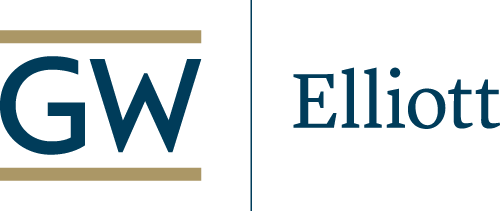
Gihyeok Kwak is a second-year Master’s candidate in the M.A. in International Affairs program at the Elliott School, concentrating on International Affairs and Development. He received his bachelor’s degree in Conflict Analysis and Resolution studies at George Mason University in 2022. He is interested in international politics, economics, diplomacy, and international development and hopes to become a person who spreads good influence around the world based on this diverse knowledge.
What has been your favorite experience at the Elliott School so far and why?
My favorite experience at the Elliott School so far has been the opportunity to gain profound academic knowledge of international relations. Moreover, Elliott School professors with diverse experience in international relations provided a fantastic academic curriculum that allowed students to apply their deep academic knowledge of international relations to real-life scenarios, collaborate with peers, and engage in diplomacy. This experience enhanced my understanding of international relations. Furthermore, the Elliott School, located in the heart of Washington, D.C., enriches the profound academic knowledge of international relations learned at the school. Washington, D.C., is the center of American politics and diplomacy, where numerous international organizations and diplomatic think tanks from around the world are gathered, providing a blueprint for the practical application of the knowledge learned at school.
What courses have you found most helpful in your work, intern, or volunteer experiences and how have they been useful?
The most helpful course I found was “History and Its Uses in International Affairs.” This course has given me much more insight into how history impacts international relations and how policymakers use historical records to make policy decisions for the present day. I also gained knowledge about utilizing the historical narratives by governments, organizations, and individuals to promote their power status, get legitimacy, and support their agendas on the world stage. Thanks to this course, I have a more profound understanding of how history works and gleaned great insights about how governments, organizations, and individuals have learned the lessons from history and applied them to the policymaking process. Through this course, my critical analytical skills on international issues have improved, which will help me in future internships, international relations volunteer experiences, and policymaking.
Describe the pros and cons of being a full-time student versus a part-time student at the Elliott School.
One of the best things about being a full-time student at the Elliott School is the wide variety of academic programs available. The Elliott School offers students a variety of majors and minors that allow them to cater their education based on the jobs they want after graduation. Moreover, since the Elliott School is in the heart of Washington, D.C., it provides students with unique internship and networking opportunities to meet policymakers and professionals across various fields and thus get a jumpstart in their careers. However, balancing the demands of being a full-time student at the Elliott School, with a full course load, work, internships, other commitments can be quite challenging. Time management and good organization skills are necessary.
What resources or strategies have proven to be the most valuable in helping you reach success at the Elliott School?
The most valuable resources for success at the Elliott School is Career Services Center, which offers resume workshops, mock interviews, and networking opportunities with alumni and professionals in the field.
What advice do you have for prospective students who are comparing a graduate program at the Elliott School with other DC grad schools?
Being located in the heart of Washington DC, the center of politics, diplomacy, and international relations, is the Elliott School’s greatest advantage and further maximizes all the school’s strengths. As a result, if you have a dream and passion in the field of international relations, go straight ahead. Because everything you do can be meaningless without dreams and passion.
If you could have dinner with any person from history, who would it be and why?
If I could have dinner with any one person from history, I would like to have dinner with President Syngman Rhee, the first president of the Republic of Korea. President Syngman Rhee graduated from George Washington University. I want to express my gratitude to him as the person who created the foundation of today’s South Korea by protecting South Korea’s liberal democracy amidst the worldwide wave of communism after World War II.
Want to connect with current Elliott School students and alumni? Click here to see how!
Find out more about this program by creating a CustomViewbook!
Join us for an information session, RSVP here!
Click here to apply to the Elliott School!
Twitter · Facebook · Instagram
The #WeAreElliott profile series is managed by the Elliott School Office of Graduate Admissions and highlights current students to answer common questions posed by prospective, incoming, and current students. For more information on this series or to submit questions, e-mail the Office of Graduate Admissions at esiagrad@gwu.edu.
The views expressed by students profiled do not necessarily represent those of organizations they work for, are affiliated with, or the Elliott School of International Affairs.



